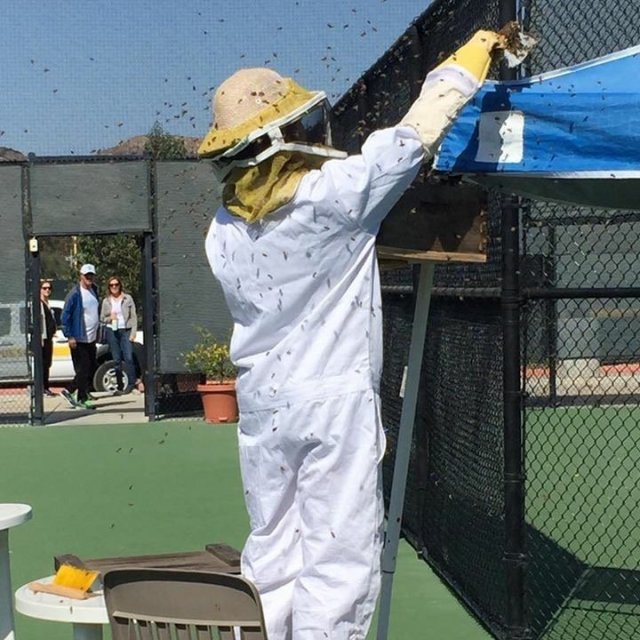Resident 'queen bee' clears court
Athletes call in garden manager

Senior Christina Geldert helped remove a swarm of bees from near the tennis courts on Saturday before the Regals played Chapman.
Photo: Kecia DavisThere are rain delays, travel delays and even equipment delays.
But a bee delay?
That's what happened before the Cal Lutheran women's tennis match on Saturday morning at Cal Lutheran.
The Regals were preparing to play Chapman when they noticed a swarm of bees had settled on a pop-up tent just outside one of the courts.
Luckily for CLU, their resident bee expert was nearby.
Christina Geldert is the student manager of the SEEd Project Garden on campus. The senior biology major was attending a volunteer event at the garden Saturday when she received word about the bee problem at the tennis courts.
Geldert has been working with bees at CLU since her freshman year and is doing her senior thesis on honey bee gut microbiota.
Once she observed the swarm, Geldert determined her method of extraction.
She grabbed an empty hive box while classmate Vinny Pacera cut a piece of wood to attach to the bottom of the box. Pacera drilled holes into the side for the bees to enter.
Geldert slipped into her beekeeping suit, climbed onto a chair and began scooping the bees into the box.
"They were some type of European honeybees that we have around here that live in colonies. They seemed pretty docile," Geldert said. "It's hard to judge their temperament though because they don't have a home to protect, so they won't be as aggressive."
Geldert was not surprised to see the bees near the courts.
"This is the time of year when bees swarm because their hives get kind of crowded and they have to store a lot of honey," she said. "They find nearby trees or pop-up tents to stay temporarily and then send out scout bees to try and find a new location to live. The pop-up tent is really just like transitional housing."
The CLU men's tennis players first noticed the bees congregating during their practice Friday afternoon.
CLU head athletic trainer Kecia Davis went out to the courts Saturday morning to deliver water and saw the corner of the tent had been swarmed.
"One of the girls on the team knew Christina worked with bees, so they tried to contact her and we just waited for her to come," Davis said. "She showed up in her little outfit and started sweeping them off. It was almost like 'Where's Waldo?' watching her trying to find the queen bee in all those bees."
This isn't the first time Davis has dealt with bees interfering with sporting events.
"When I played softball at Cal Poly, there were bushes behind home plate and swarms would come," Davis said. "They had to call the beekeeper at Cal Poly to come over and cut the branch off and get the queen bee into the box and take it away. But this is the first time I've seen it happen at CLU in the 25 years I've been here."
Geldert's interest in bees started during her freshman year when Dr. Bryan Rasmussen wanted to get bees for the SEEd garden. He asked if Geldert would be interested in learning more about bees.
"I didn't really know anything, but I figured why not. We literally just bought suits and started reading and doing research and got our first hives," said Geldert, a Reno, Nevada, native. "Once I put on the suit, it was like 'OK, I'm a beekeeper.' Since then, I have learned so much about them."
Geldert is doing bee research in the microbiology lab under the guidance of Dr. Theresa Rogers. She received a grant last summer to study the bacteria in the stomachs of bees and see if it has any implications on their immune systems.
"The global honeybee population is dying and it is happening really quickly. It's a big thing and nobody know why it's happening. I just kind of jumped into the pool of research to figure it out," Geldert said. "I guess my role at CLU has been to raise awareness about it and make it a good location for bees."
Geldert was happy the campus stuff contacted her to handle the bee problem at the tennis courts. The match was only delayed by 20 minutes from its original 10 a.m. start.
"If they had called an exterminator that would have been really bad for those bees. They wouldn't get a chance to live and the hives would not have been pollinated," Geldert said. "It was nice to give them a chance to survive and let the tennis match keep going."
Once she removed the bees, Geldert brought the box back to the garden and put honeycomb inside.
"It's basically like getting a furnished apartment. If they feel like they have the resources, they are more likely to stay," she said. "They can live near the other bee hives because bees know which hive is their own and they can be friendly neighbors."
Geldert is scheduled to graduate from CLU in two weeks with her degree in biology. She wants to be a veterinarian, and will begin applying to vet schools this summer.
"I am toward the end of my reign as queen bee here at CLU I guess," Geldert said with a laugh. "I am a little bummed I have to give up the hives. Hopefully someone else can take over."
In case of another bee emergency, the CLU athletes would surely agree.
--- Published in the Ventura County Star on May 2, 2016